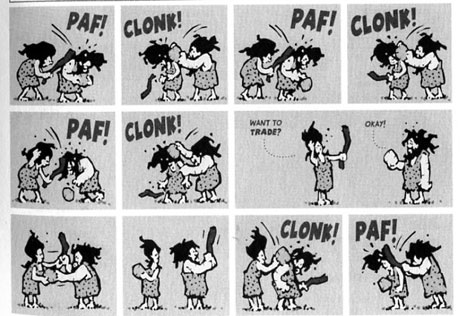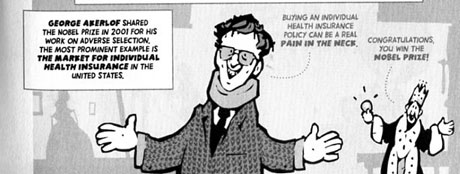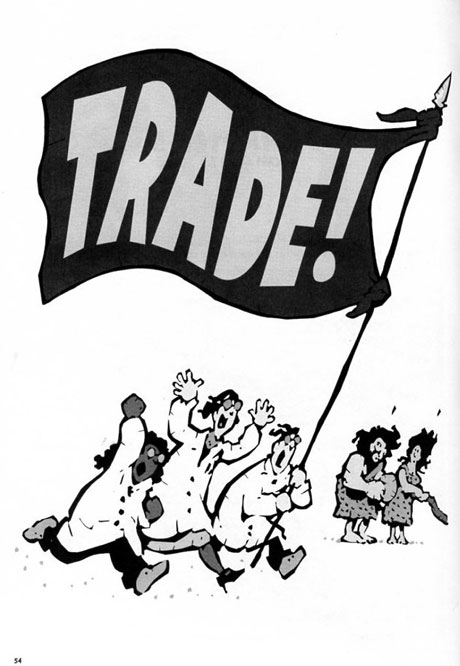The Cartoon Introduction to Economics, Volume 1: Microeconomics
Grady Klein and Yoram Bauman; Hill and Wang; ,224 pp., $17.95; B&W, Softcover; ISBN:978-0809094813
“…nobody, except under threat of torture, can read a school book,” George Bernard Shaw commented. “The reason is that a school book is not a work of art.”
Comics were for many years not considered art either … but in general because they were too easy to read, not too hard. Historically, comics have been sneered at for their excessive accessibility — a trait which makes it difficult (though as recent art-comix trends show, not impossible) for them to attain the rarefied level of obfuscation required for highbrow modernist cred.
The same qualities which doomed them to generations of academic disdain, however, make comics perfect for conveying basic information without sending long-suffering students into a stupor. Scott McCloud figured this out years ago, with the result that, despite their pedestrian insights and hideous design, his books have become staples in introductory college courses nationwide.
Artist Grady Klein and economist Yoram Bauman have taken McCloud’s insights, applied them to material that is not (unlike McCloud’s) actively idiotic, and come up with a thoroughly readable book that explains microeconomics clearly, and even charmingly. Bauman (who has spent time teaching in high schools as well as colleges) and Klein do an excellent job of using analogies to explain the abstract concepts of economics, whether demonstrating Pareto efficiencies by dividing cake, or illustrating elasticities with the use of a torture rack.
The creators are also, in the best traditions of comics, willing to throw in the odd gratuitous joke for pure amusement value:
And, again as per comics tradition, they even engage in some gentle satire. For example, in a series of running gags, the creators cheerfully suggest that a fair bit of economics is simply coating the obvious with a patina of scientific pretension.
But though the book is enjoyable to page through, it’s not exactly a delight to look at. Klein is a better illustrator than Scott McCloud, but that doesn’t mean his drawing is attractive. His characters have a thick, generic, formless quality that suggests clip art, and his layout and design skills are solidly so-so. It’s easy enough to figure out where your eyes are supposed to go on the page, but that’s the most you can say for the layout. His occasional full-page splashes are notable mainly for their lameness; this, for example, is an impressively ineffective use of white space:
Bauman too, has his limitations. While he’s willing to poke fun at economists on occasion, his skepticism has definite limits. There’s no sense in his work of the contested historical or cultural place of economics as a discipline. Thus, the Nobel Prize is mentioned, but not the fact that there is, in fact, no Nobel Prize in economics — the “extra” faux Nobel was added by bankers, because bankers really like economics. Similarly, Fidel Castro and Che Guevara pop up as stereotypical figures of fun, but communism, with it’s generalized assault on the ideological place of economics, is never mentioned.
An economics textbook, of course, is meant to teach you economics; it’s not intended question its own premises. But, whether that’s a failure of Bauman or of the textbook genre, the result is a chirpy platitudinous boosterism, with the last pages of the book assuring the reader that economics can offer “creative and powerful solutions” to problems like climate change.
So is this book a work of art? I would say that it is — though not a great one. Whatever its weaknesses, it was clearly created by particular people to be read by particular other people, rather than, as is the case with most textbooks, created by committee to be read by no one. As a longtime professional educator (God help me), I’d certainly recommend it for high school or first-year college classes, where even mediocre art would be a vast improvement over the general bill of fare.
______________________
This review first ran online at The Comics Journal.



